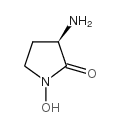R(+)-3-氨基-1-羟基-2-吡咯烷酮

R(+)-3-氨基-1-羟基-2-吡咯烷酮结构式

|
常用名 | R(+)-3-氨基-1-羟基-2-吡咯烷酮 | 英文名 | (R)-(+)-HA-966 |
|---|---|---|---|---|
| CAS号 | 123931-04-4 | 分子量 | 116.11900 | |
| 密度 | 1.436g/cm3 | 沸点 | 258.6ºC at 760mmHg | |
| 分子式 | C4H8N2O2 | 熔点 | N/A | |
| MSDS | 美版 | 闪点 | 110.2ºC |
R(+)-3-氨基-1-羟基-2-吡咯烷酮用途(R)-(+)-HA-966 ((+)-HA-966) 是 N-甲基-D-天冬氨酸 (NMDA) 受体复合物的甘氨酸位点的部分激动剂/拮抗剂。(R)-(+)-HA-966 通过苯丙胺选择性阻断中脑边缘多巴胺系统的活化。(R)-(+)-HA-966 可透过血脑屏障,有用于神经性和急性疼痛的潜力。 |
| 中文名 | R(+)-3-氨基-1-羟基-2-吡咯烷酮 |
|---|---|
| 英文名 | (R)-(+)-HA-966,(R)-(+)-3-Amino-1-hydroxypyrrolidin-2-one |
| 英文别名 | 更多 |
| 描述 | (R)-(+)-HA-966 ((+)-HA-966) 是 N-甲基-D-天冬氨酸 (NMDA) 受体复合物的甘氨酸位点的部分激动剂/拮抗剂。(R)-(+)-HA-966 通过苯丙胺选择性阻断中脑边缘多巴胺系统的活化。(R)-(+)-HA-966 可透过血脑屏障,有用于神经性和急性疼痛的潜力。 |
|---|---|
| 相关类别 | |
| 靶点 |
glycine site of the NMDA receptor[1][2] |
| 体内研究 | (R) -(+)-HA-966(+)-HA-966;10 mg/kg;i v)显著减弱全身NMDA(125、250、500和1000 mg/kg;i.v.)引起的剂量依赖性升压反应和相关的心动过速反应[3]。(+)-HA-966(30100 mg/kg;IP)剂量依赖性地阻断安非他明对伏隔核多巴胺合成的增强作用,但对雄性BKTO小鼠纹状体多巴胺合成的增加没有影响(20-30g)[1]。动物模型:Sprague-Dawley大鼠(11~12周龄)[3]剂量:10mg/kg给药:IV结果:明显减弱全身NMDA引起的剂量依赖性升压反应及相关心动过速反应。 |
| 参考文献 |
| 密度 | 1.436g/cm3 |
|---|---|
| 沸点 | 258.6ºC at 760mmHg |
| 分子式 | C4H8N2O2 |
| 分子量 | 116.11900 |
| 闪点 | 110.2ºC |
| 精确质量 | 116.05900 |
| PSA | 66.56000 |
| 外观性状 | 白色固体 |
| 蒸汽压 | 0.002mmHg at 25°C |
| 折射率 | 1.59 |
| 储存条件 | 保持贮藏器密封、储存在阴凉、干燥的地方,确保工作间有良好的通风或排气装置 |
| 稳定性 | 如果遵照规格使用和储存则不会分解,未有已知危险反应 |
| 分子结构 | 1、摩尔折射率:27.28 2、摩尔体积(cm3/mol):80.8 3、等张比容(90.2K):236.7 4、表面张力(dyne/cm):73.5 5、介电常数:无可用的 6、极化率(10-24cm3):10.81 7、单一同位素质量:116.058578 Da 8、标称质量:116 Da 9、平均质量:116.1185 Da |
| 计算化学 | 1、 疏水参数计算参考值(XlogP):-1.5 2、 氢键供体数量:2 3、 氢键受体数量:2 4、 可旋转化学键数量:0 5、 互变异构体数量:2 6、 拓扑分子极性表面积(TPSA):68.2 7、 重原子数量:8 8、 表面电荷:1 9、 复杂度:115 10、同位素原子数量:0 11、确定原子立构中心数量:1 12、不确定原子立构中心数量:0 13、确定化学键立构中心数量:0 14、不确定化学键立构中心数量:0 15、共价键单元数量:1 |
| 更多 | 1. 性状:白色固体 2. 密度(g/mL,20℃):未确定 3. 相对蒸汽密度(g/mL,空气=1):未确定 4. 熔点(ºC):164-165 5. 沸点(ºC,常压):未确定 6. 沸点(ºC,KPa):未确定 7. 折射率:未确定 8. 闪点(ºC):未确定 9. 比旋光度(º):未确定 10. 自燃点或引燃温度(ºC):未确定 11. 蒸气压(Pa,20ºC):未确定 12. 饱和蒸气压(KPa,20ºC):未确定 13. 燃烧热(KJ/mol):未确定 14. 临界温度(ºC):未确定 15. 临界压力(KPa):未确定 16. 油水(辛醇/水)分配系数的对数值:未确定 17. 爆炸上限(%,V/V):未确定 18. 爆炸下限(%,V/V):未确定 19. 溶解性:可溶于水 |
| 个人防护装备 | Eyeshields;Gloves;type N95 (US);type P1 (EN143) respirator filter |
|---|---|
| 危险品运输编码 | NONH for all modes of transport |
|
Enantiomers of HA-966 (3-amino-1-hydroxypyrrolid-2-one) exhibit distinct central nervous system effects: (+)-HA-966 is a selective glycine/N-methyl-D-aspartate receptor antagonist, but (-)-HA-966 is a potent gamma-butyrolactone-like sedative.
Proc. Natl. Acad. Sci. U. S. A. 87 , 347, (1990) The antagonist effect of (+/-)-3-amino-1-hydroxypyrrolid-2-one (HA-966) at the N-methyl-D-aspartate (NMDA) receptor occurs through a selective interaction with the glycine modulatory site within the r... |
|
|
The discriminative stimulus properties of (+)-HA-966, an antagonist at the glycine/N-methyl-D-aspartate receptor.
Eur. J. Pharmacol. 186 , 129, (1990) Using a two-lever operant drug discrimination paradigm, rats have been trained to discriminate between the administration of saline and R-(+)-HA-966 (R-(+)-3-amino-1-hydroxypyrrolid-2-one, 30 mg/kg i.... |
|
|
Stereoselectivity for the (R)-enantiomer of HA-966 (1-hydroxy-3-aminopyrrolidone-2) at the glycine site of the N-methyl-D-aspartate receptor complex.
J. Neurochem. 55 , 1346, (1990) HA-966 (1-hydroxy-3-aminopyrrolidone-2) is an antagonist at the glycine allosteric site of the N-methyl-D-aspartate receptor ionophore complex. Unlike presently known glycine antagonists, HA-966 is ch... |
| MFCD00078583 |
| R(+)-3-Amino-1-hydroxy-2-pyrrolidinone |


